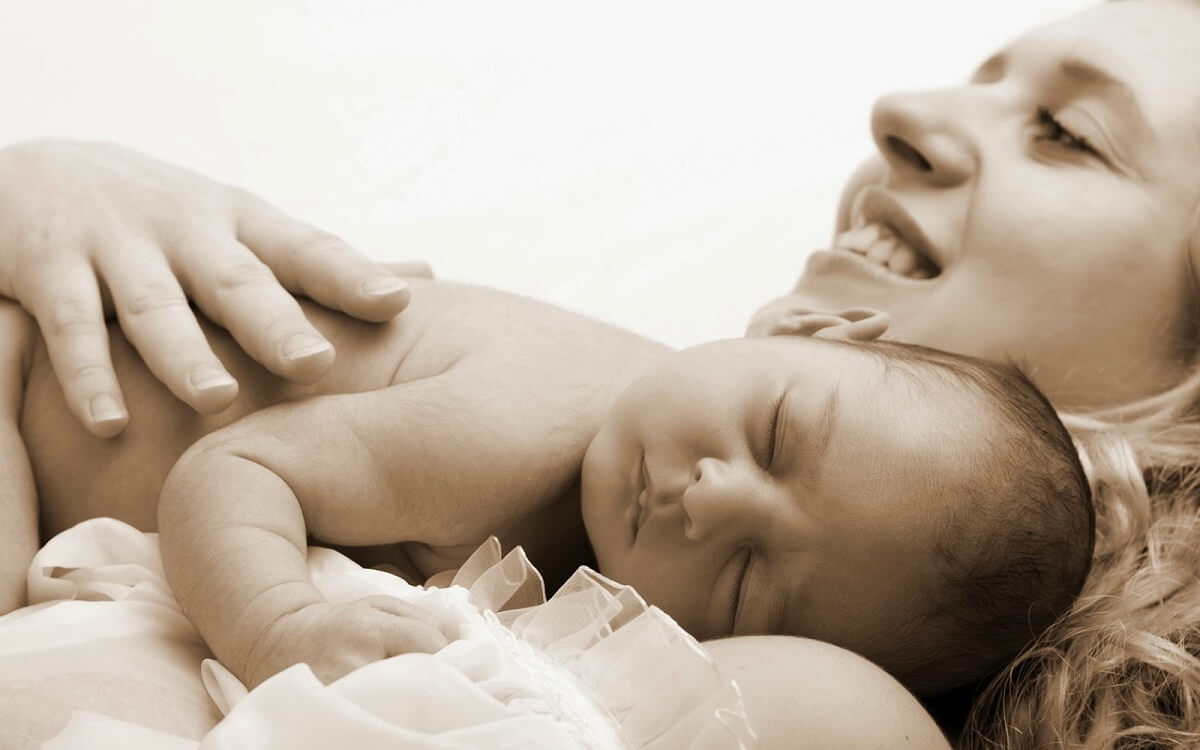Attachment Theory: Why is it important to hug your baby often?

Today we want to explain why it’s so important to hug your baby frequently.
Do you know about the many health benefits of hugging? Do you know how necessary this physical contact is for the emotional development of your baby?
Why should we hug one another?
Hugging has a direct and positive effect on our health. It doesn’t matter how old you are; as human beings we need to be touched and embraced from the moment we are born and for the rest of our lives.
Physical contact plays a very important role in the development of neurons. To keep these neurons from dying, it’s vital that we stimulate them from the time we’re born.
Thanks to hugging, we can reduce and prevent many illnesses, both physical and emotional.
When we hug, we relieve stress, anxiety and depression. The levels of the hormone oxytocin increase, improving our health.
Whenever I can, I go to see my friends. I hug and am hugged back.
-Jorge Bucay-

The benefits of giving hugs
It increases serotonin and dopamine levels
Hugging reduces stress levels and improves our mood.
Hugging improves the immune system
The immune system is strengthened and white blood cells increase.
It reduces arterial blood pressure
Hugging causes the pressure receptors called Pacinian corpuscles to activate. This sends a signal to the vagus nerve, an area of the brain that’s responsible for arterial reduction.
Hugging cares for the heart
Hugging someone improves their heart rate.
Hugging alleviates fear
Hugs significantly reduce worry and they help calm fears, providing peace and comfort.
It rejuvenates the body
Hugging favors the oxygenation of body tissue. It also increases the life of cells and impedes premature aging.
Hugs improve mood and bring happiness
When someone hugs us, we feel the happiness and security we need to lift our self-esteem, due to the increase in serotonin production.
Hugging reduces the risk of dementia
We need to give and receive hugs throughout our entire lives. Hugs even help to prevent dementia.
Hugs are calming and balance our nervous system.

Why is it necessary to hug your baby often?
Scientists consider attachment to be the most important factor in the healthy development of babies.
Attachment refers to positive physical contact. In other words, hugging, kissing and cuddling your child. These activities cause specific neurochemical responses in the brain and lead to the correct organization of the brain systems responsible for attachment.
It’s a well-known fact that during the first three years of life, the brain develops 90% of its adult size. During this time, a baby’s brain will put the majority of the systems and structures in place that will be responsible for his emotional, behavioral, social and physiological functioning for the rest of his life.
Countless scientific studies have found that children who receive hugs and have formed healthy bonds in their day-to-day life since birth develop the following:
- A higher stress-control aptitude
- Healthier interpersonal relationships
- Excellent scholastic performance
- Higher self-esteem
What is the attachment theory?
Babies try to create bonds with the people who take care of their needs, including even less affectionate adults. This bond is based on more than just food and nutrition. It goes far beyond your baby’s need to be fed.
When a child is born, he looks to be close to his mother. A baby’s crying, his desire to be held, his reflex smiles and his need to nurse are all factors that keep him close to his mother.
Our children have an innate need to be unconditionally accepted and protected. And this is the basis for the continuation of the human species.
Attachment has life-long implications. Babies that form a healthy and safe attachment see their parents as sources of comfort and a solid platform from which they can play and explore their world.
Thanks to this strong emotional foundation based on trust, these children become confident, caring and competent adults.
Healthy emotional bonds between parents and children are the fruit of daily care and affection.
Although your baby is the most beautiful and enchanting thing you’ve ever seen, he’s also a new being in your life. You need to get to know him.
So go ahead! You’ve got an entire life ahead of you!
Today we want to explain why it’s so important to hug your baby frequently.
Do you know about the many health benefits of hugging? Do you know how necessary this physical contact is for the emotional development of your baby?
Why should we hug one another?
Hugging has a direct and positive effect on our health. It doesn’t matter how old you are; as human beings we need to be touched and embraced from the moment we are born and for the rest of our lives.
Physical contact plays a very important role in the development of neurons. To keep these neurons from dying, it’s vital that we stimulate them from the time we’re born.
Thanks to hugging, we can reduce and prevent many illnesses, both physical and emotional.
When we hug, we relieve stress, anxiety and depression. The levels of the hormone oxytocin increase, improving our health.
Whenever I can, I go to see my friends. I hug and am hugged back.
-Jorge Bucay-

The benefits of giving hugs
It increases serotonin and dopamine levels
Hugging reduces stress levels and improves our mood.
Hugging improves the immune system
The immune system is strengthened and white blood cells increase.
It reduces arterial blood pressure
Hugging causes the pressure receptors called Pacinian corpuscles to activate. This sends a signal to the vagus nerve, an area of the brain that’s responsible for arterial reduction.
Hugging cares for the heart
Hugging someone improves their heart rate.
Hugging alleviates fear
Hugs significantly reduce worry and they help calm fears, providing peace and comfort.
It rejuvenates the body
Hugging favors the oxygenation of body tissue. It also increases the life of cells and impedes premature aging.
Hugs improve mood and bring happiness
When someone hugs us, we feel the happiness and security we need to lift our self-esteem, due to the increase in serotonin production.
Hugging reduces the risk of dementia
We need to give and receive hugs throughout our entire lives. Hugs even help to prevent dementia.
Hugs are calming and balance our nervous system.

Why is it necessary to hug your baby often?
Scientists consider attachment to be the most important factor in the healthy development of babies.
Attachment refers to positive physical contact. In other words, hugging, kissing and cuddling your child. These activities cause specific neurochemical responses in the brain and lead to the correct organization of the brain systems responsible for attachment.
It’s a well-known fact that during the first three years of life, the brain develops 90% of its adult size. During this time, a baby’s brain will put the majority of the systems and structures in place that will be responsible for his emotional, behavioral, social and physiological functioning for the rest of his life.
Countless scientific studies have found that children who receive hugs and have formed healthy bonds in their day-to-day life since birth develop the following:
- A higher stress-control aptitude
- Healthier interpersonal relationships
- Excellent scholastic performance
- Higher self-esteem
What is the attachment theory?
Babies try to create bonds with the people who take care of their needs, including even less affectionate adults. This bond is based on more than just food and nutrition. It goes far beyond your baby’s need to be fed.
When a child is born, he looks to be close to his mother. A baby’s crying, his desire to be held, his reflex smiles and his need to nurse are all factors that keep him close to his mother.
Our children have an innate need to be unconditionally accepted and protected. And this is the basis for the continuation of the human species.
Attachment has life-long implications. Babies that form a healthy and safe attachment see their parents as sources of comfort and a solid platform from which they can play and explore their world.
Thanks to this strong emotional foundation based on trust, these children become confident, caring and competent adults.
Healthy emotional bonds between parents and children are the fruit of daily care and affection.
Although your baby is the most beautiful and enchanting thing you’ve ever seen, he’s also a new being in your life. You need to get to know him.
So go ahead! You’ve got an entire life ahead of you!
All cited sources were thoroughly reviewed by our team to ensure their quality, reliability, currency, and validity. The bibliography of this article was considered reliable and of academic or scientific accuracy.
- Bowlby, J. (1986). Vínculos afectivos: formación, desarrollo y pérdida. Madrid: Morata.
- Bowlby, J. (1995). Teoría del apego. Lebovici, Weil-HalpernF.
- Garrido-Rojas, L. (2006). Apego, emoción y regulación emocional. Implicaciones para la salud. Revista latinoamericana de psicología, 38(3), 493-507. https://www.redalyc.org/pdf/805/80538304.pdf
- Marrone, M., Diamond, N., Juri, L., & Bleichmar, H. (2001). La teoría del apego: un enfoque actual. Madrid: Psimática.
- Moneta, M. (2003). El Apego. Aspectos clínicos y psicobiológicos de la díada madre-hijo. Santiago: Cuatro Vientos.
This text is provided for informational purposes only and does not replace consultation with a professional. If in doubt, consult your specialist.








